Get Inspired
Carlijn Schoutens' Olympic Comeback
Olympic medalist Carlijn Schoutens is a rising star on the speed skating circuit, but her career was put on hold because of a long struggle with Post-Concussion Syndrome (PCS) during the 2015-2016 season. A seemingly harmless fall during practice led to a grueling year of symptoms, relapses, and unfamiliar challenges.
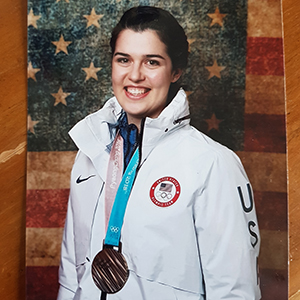
Posted: July 25, 2018
By, Michael Burke
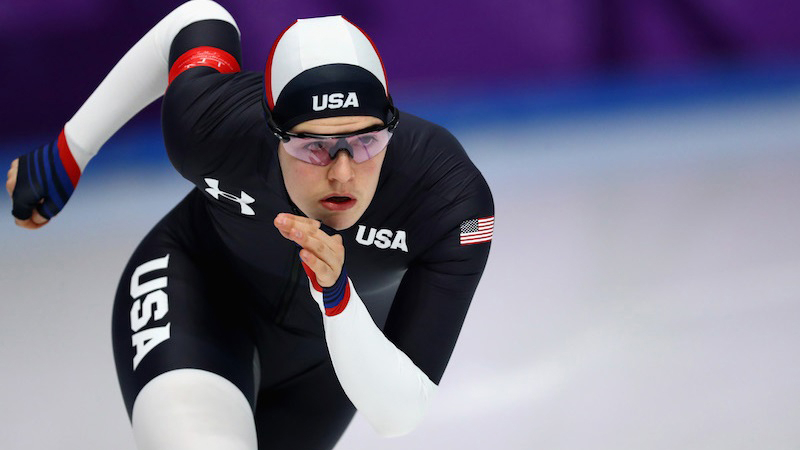
Despite wanting to return to training, Schoutens battled nausea, headaches, light sensitivity, and emotional instability that made training impossible. But after taking the time to recover fully, Schoutens returned to the ice for the 2016-2017 season healthy and determined to reach the 2018 Winter Olympics in Korea. Schoutens’ remarkable drive to realize her Olympic dreams helped her overcome a late start to the 2016-2017 season and carried her all the way to Pyeongchang, where she earned a bronze medal in the Team Pursuit event.
Now, Schoutens is sharing her experience and joining the Concussion Legacy Foundation as a Team Up Speak Up Ambassador to help athletes who are struggling to cope with their concussions. Read on for an Olympic perspective on the hardest part of recovering from PCS, seeing an elite teammate struggle with a concussion, and what athletes at every level can do to navigate these challenges.
You suffered a pretty serious concussion back in 2015. How much did you know about concussions before then?
Not enough. I didn't realize that it was a potential problem in my sport. I must have been around people that had concussions, especially in short track where there are more falls, but it just wasn't on my radar. I always thought of contact sports first. Luckily it was on my coach’s radar.
I fell in a really uneventful way. I slipped in the turn and slammed into the pads, just like you’re taught to do as a kid: with your back first in a seated position. That was all completely textbook. At first, I had no symptoms at all - I finished the workout, did another workout, and went to work.
The next morning, I woke up early and I threw up. I tried to fall asleep, but I kept throwing up. I texted my coach and told him “I must have food poisoning or I'm just sick. I can't come train.” He was worried because I had fallen the day before so he sent someone over to take me to the hospital. I was diagnosed with a concussion there. It never occurred to me that the nausea could have been from a concussion.
Schoutens (left) celebrating with her Team Pursuit teammates Mia Mangenello, Brittany Bowe, and Heather Bergsma in Pyeongchang after winning bronze.
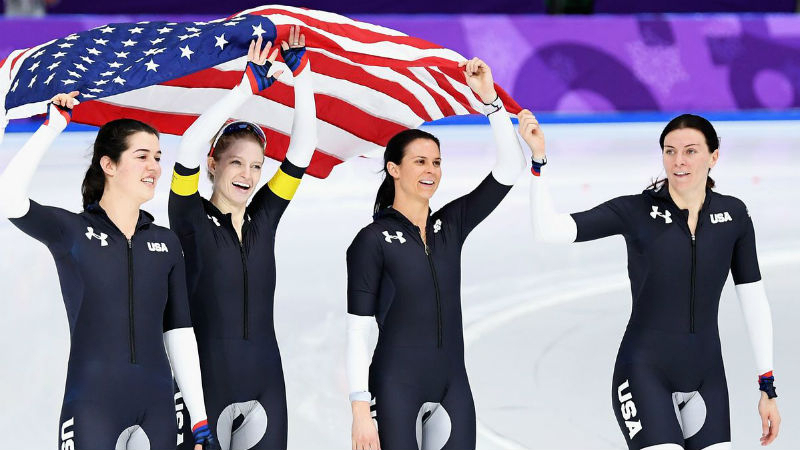
No concussion experience and recovery are exactly alike. What was the most difficult part for you and what made the biggest difference in your recovery?
The early phase was easier, even though I was really sick - nausea, headaches, locked in a dark room kind of thing. There was a lot of empathy and understanding as to why I couldn’t come to practice and I couldn’t train.
Then there came this whole phase where I kept getting knocked back down in the recovery process when I thought I was ready to go. It became really frustrating – feeling like the recovery was dragging on forever. I didn't know how to resume training without taking more risks. On top of that frustration, I had some cognitive symptoms like sadness and emotional instability. I didn’t know what more I should be doing to get better and I thought that was way harder.
So, I think a couple months later when I still was not over the concussion was a lot harder than the acute phase.
What were some things you didn’t know about concussions before you had one?
I didn't really realize that mental or emotional symptoms can be a part of it. For me, after 4 or 5 months, it got really tough mentally to keep being patient and stay sane.
I also had never experienced the difference between [orthopedic] injuries and concussions. Not long after I got injured a teammate broke his arm and he couldn't skate either. But the difference was, soon after his injury, he was able to go watch practice and hang out and cheer people on. I was so jealous of that because I couldn't even do that. I couldn't have that social interaction and support my teammates because I was stuck at home. I always felt like with some other injuries that are more visible or more physical you can focus on something else for a little while - like make a lot of progress in school or go on a vacation or go home. With a concussion, you can't do anything at all and that was what was so tough about it.
What do you wish someone had told you while you were recovering from your concussion?
Focusing on recovery is very important. At first, they told me not to train for a week and I was like—ok, that's pretty bad. I had no idea how much worse it was about to get. There was a point about 4 months in where we finally decided to give up on my season and that was just a load off my shoulders. I could just do nothing at all and focus on my recovery and not worry about skating for a bit.
I talked to a sports psychologist a lot throughout. One time he put me in touch with another athlete of his who had had a concussion. We just met up and had a coffee and she told me about her experience with her concussion. That was very helpful to me. Having that connection with her and being able to text her saying, 'Oh I'm still not better. How are you?' That was really nice.
I also did a good job of tracking my symptoms. I have a whole collection of sheets where I tracked my symptoms so we were able to see some kind of trend and progress and that was helpful.
Finally, setting small goals for things other than skating really helped me. Like 'Oh today I'm going to floss my teeth' and that would be my goal for the day. If I did it, I could check it off the list and say I had at least accomplished something.
Schoutens' first skate after months of tracking her concussion symptoms in a notebook.
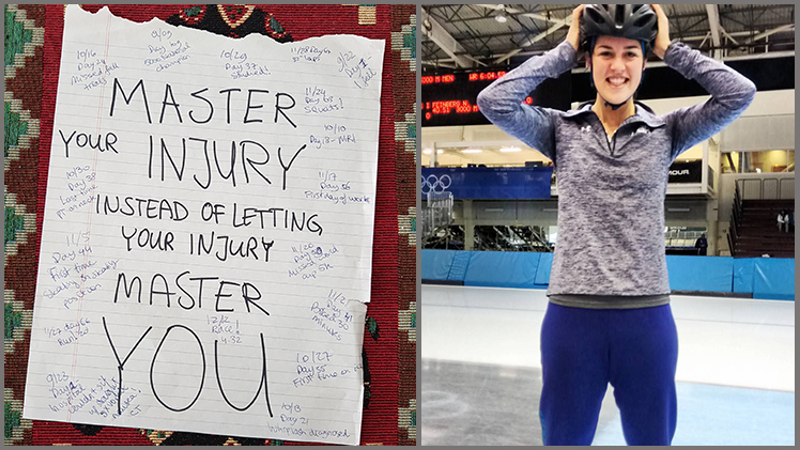
Your teammate Brittany Bowe also suffered a concussion in 2016. Did you ever get a chance to talk about the experience with her?
We're around each other all the time so we definitely shared some experiences. I had just recovered and made my initial comeback when it happened to her. We had a very similar timeline – concussion in the early season, trying to come back, and having recurring symptoms. It was very similar to my experience. It’s pretty special that we were eventually on a team together and got that bronze medal after we both had very similar struggles leading up to the Olympics.
How do you think speed skating in general views concussions?
I think they are taken seriously now. What happened to me and Brittany gave people a reminder that concussions don’t only happen in short track and that concussions can be very, very serious.
Do you think Olympic athletes are properly informed about the risks of head trauma?
I think they are taken seriously now. What happened to me and Brittany gave people a reminder that concussions don’t only happen in short track and that concussions can be very, very serious.
Do you think Olympic athletes are properly informed about the risks of head trauma?
I think at my level, yes. We have so many resources being on the national team. I had a trainer that was available to drive me to the hospital the same day I started showing signs of a concussion and saw a doctor that was affiliated with US Speed Skating and could give direct feedback to my coaches.
But if you're trying to get to the national level and you're maybe five years old and you're just at your local team with your local coach, maybe people don’t fully understand that a concussion is an injury that’s very serious. Not everyone has the same support we do, so I think that, for those kids that are trying to get to the national level, awareness is probably not as great.
So, what I would say to those kids is, even if you don't feel outside pressure, you have to get over that pressure that you feel within yourself. I feel like that's a very big hurdle to overcome to finally give yourself time to recover and put that before any other goal you have.
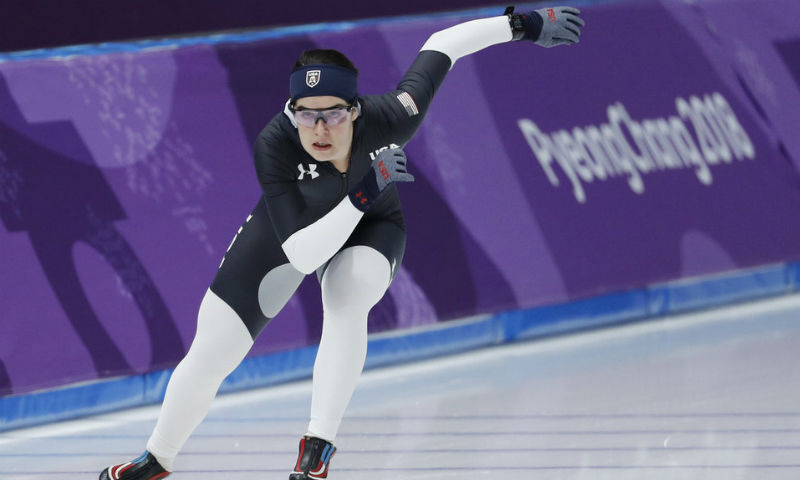
How important do you think it is for elite athletes to set a good example when it comes to dealing with concussions?
I think that's really important. If I was a 15-year-old with a concussion and I was getting ready for Junior Nationals or another big competition, I might want to ignore the symptoms of a concussion and be quiet about it and act like it never happened. But if I see someone at a higher level going through the same thing and stressing how important it is to focus on recovery then I maybe would feel more supported and be able to make the right decision.
How do you hope to use your role as a CLF Team Up Speak Up Ambassador to impact your sport?
I think both my positions – as a Team Up Speak Up Ambassador and member of the US Speedskating Athletes' Advisory Council - give me an approachable, role model position where anyone could feel like I'm there to look out for them and help them.
I hope that I can use my reach within sports to let people know that I had a concussion and that it ended well after I took it seriously. I hope that everyone feels like they can reach out to me if they have any questions or they can use what happened to me as guidance for making their own decisions and feel like they aren't alone in their concussion struggles.
What’s next for you?
I'm going to continue to speed skate in Salt Lake City. I was in medical school before I took a break to get ready for the Olympics so I'm also resuming medical school. I'm really looking forward to doing some research with the orthopedics department in Utah.
You May Also Like
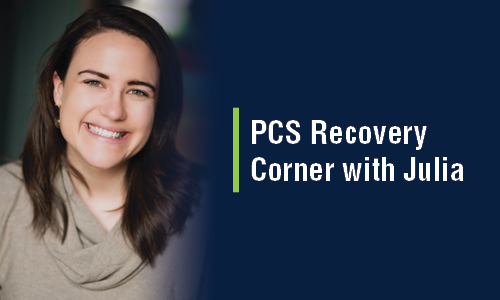
It is easy to feel misunderstood with PCS. CLF's Julia Manning gets it. She suffered from PCS for several years and opens up about the hardest parts, plus the coping strategies and treatment tips she picked up along the way.
PCS Recovery Corner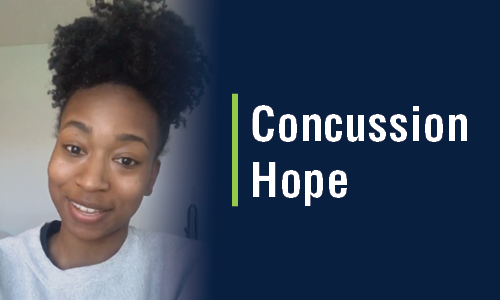
Your PCS will get better, and recovery is possible. Holding on to that hope is key. Get inspired with video messages from dozens of others who have battled PCS.
Concussion Hope Videos